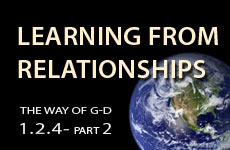 Vampire Weekend's Surprising Jewish Stories
Vampire Weekend's Surprising Jewish Stories


6 min read
Relationships provide the deepest insights into our connection with G-d.
1:2:4 (Part 2)
Section 1: The Fundamentals of Existence
Chapter 2: Purpose of Creation
Point 4
For the intended purpose to be successfully achieved, means must exist through which this [human] creature can earn perfection. This, in turn, will require that creation contains many different elements, interconnected by a multitude of relationships.
The purpose of creation is for humans to make choices that will lead to the pleasure of connection to G-d. So it makes sense that the ability to do this should exist constantly, 24/7. Therefore, explains the Ramchal, "creation contains many different elements, interconnected by a multitude of relationships." This underlies everything that we do from the moment we wake until we go to sleep.
(Actually, even the idea of sleep has a purpose. Otherwise, why would there be hours every day where we are to be unconscious – unable to make choices and fulfill our purpose? The Ramchal will deal with this in Chapter 5.)
The Ramchal talks about relationships, and in a sense, that's the way he describes our connection to G-d altogether.1 So it makes sense to look at our relationships as the area for the most explicit messages, the clearest metaphors, and the deepest insights into our relationship with G-d.
No wonder that the Torah and rabbinic writings variously refer to G-d as "Father," "King," etc. These corresponding human relationships teach us something about G-d. From my relationship with my parents, I begin to understand something about gratitude and love. My relationship with authority ("king") is largely based on respect, and the fear of consequences. (Imagine New York City with the entire police force on strike.)
A whole book of Bible, Song of Songs, is a "story" about a man whose wife was unfaithful and begs to come back to her husband. If it wasn't a book of the Bible, it would sound like a poetic romance novel. As a book of the Bible, however, we understand it all as a metaphor: G-d is the husband, the Jewish people are the disloyal spouse (i.e. served other gods). If we lived in a world where the concept of adultery didn't exist, it would be impossible for us to understand what's so bad about idol worship from G-d's perspective.
In our last discussion, we looked at basic questions like: why parents and why food? Once we understand these basic lessons of life, we can then proceed to the finer points: why two parents with different orientations and strengths? Why a world not only of food, but of healthy food that's not as sweet (potatoes) and sweet foods with little nutritional value (chocolate). Why drinks that can intoxicate? Why poisons? And the very act of eating itself: Why do we have to chew, digest, and expel the waste?
Every one of these subtleties has a lesson within. And as we probe each aspect of our existence, we begin to realize that everything – large and small – is meant to be understood as an analogy for our relationship with G-d. And the process of further investigation never stops. Why 12 different types of apples? Why are some red and some green? Why do trees grow perpetually and vegetables have to be planted anew every year?
And on a more personal level: Why was I born to these particular parents? Why do I have a certain health problem? If everything in life is part of a plan, and the plan is to give me pleasure, I should be able to examine every aspect of what G-d gives me in life and understand the deeper message of what it means to me.
Of course, we could drive ourselves crazy and ask questions like, "Why was the stranger sitting beside me on the bus wearing a blue shirt today?", or "Why did my shoelace come undone on Wednesday at exactly 3:47 p.m.?" It doesn't make sense to "read into these things," for one important reason: There are more direct messages coming my way, where G-d is speaking to me more explicitly about bigger life issues that I may be overlooking.
"Reading" these messages takes practice and skill. When we get to Section Two of The Way of G-d, we'll spend some time in understanding "hashgacha," G-d's plans for running the world and our lives. At that point we'll learn about how to more accurately read the messages that G-d is sending us.
The creature destined for this great condition, namely, a bond of closeness to Him, is considered the main element of all creation. All else in existence is only an aid, in some aspect or regard, toward this goal, to have it succeed and become reality. The [rest of existence] is therefore considered secondary to this primary creature.
We can see that man is the ultimate purpose of creation by looking at the order of the Six Days of Creation. Since man and woman were created at the end of this process, it is apparent that everything else was leading to this climax. As we say in the Friday night Lecha Dodi prayer: "What was last in deed, was first in thought." G-d, so to speak, "prepared the food and set the table," and when everything was ready, He created the humans to step in and enjoy the creation.
![]()
